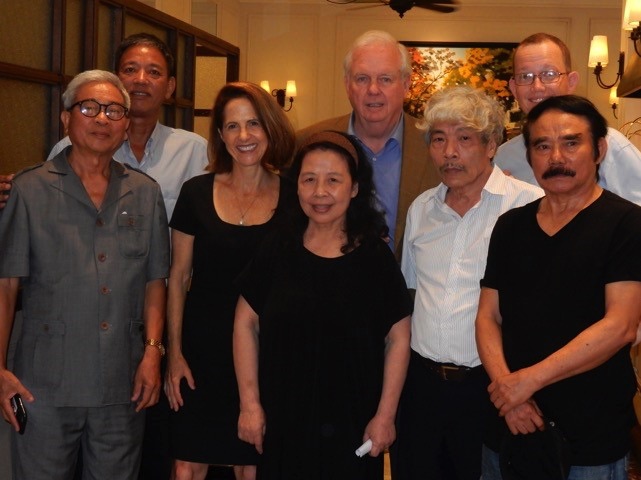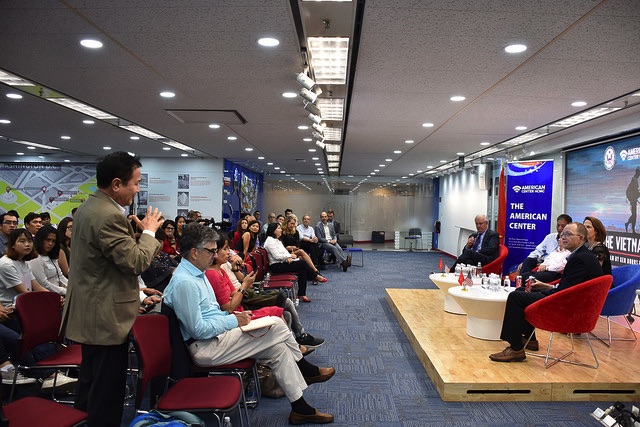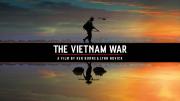When audiences nationwide encounter The Vietnam War, the new documentary series directed by Ken Burns and Lynn Novick debuting on PBS on September 17, they will likely find the experience plunging them into a deep, raw fissure in American history. It is those living memories that have a more immediate impact than the other great conflicts covered in Burns’s prior documentary, The Civil War, and the previous Burns-Novick collaboration, The War (on World War II).
Few U.S. viewers are likely to be aware that much of the film’s emotional power and new (for them) information about Vietnam reflect the essential contributions of Harvard affiliates who have worked in that country for decades. The doors they opened, according to Burns and Novick, transformed The Vietnam War.
Part of its impact, inevitably, reflects the fierce divisions the Vietnam conflict opened on the American home front. The film probes the passionate differences between those who supported the war and those who opposed, or came to oppose, it. In part by mining tape recordings of presidential conversations, it documents, painfully, citizens’ widening mistrust of a succession of administrations in Washington that the public came to feel had lied about the aims and status of the war. It is sobering to hear, unfiltered, soldiers’ accounts of their experiences in Vietnam followed by, in one instance, an end-of-duty return to raw racism upon arriving at Boston’s Logan Airport, and, in another, conversion to advocacy with Vietnam Veterans Against the War.
Another element is the obvious outcome: an outright military failure for the United States, at the cost of more than 58,000 soldiers’ lives and the ordeals of prisoners of war. The Vietnam War gives voice to a family shattered by the death in combat of a young son and brother. It also narrates the arc of a captured American who was forced to march hundreds of miles through the jungle, as his young family, long unaware of his fate, came to public prominence speaking out against the war.
But many viewers will encounter new, and perhaps unsettling, revelations of the many perspectives unveiled in interviews conducted with the Vietnamese participants. That aspect of the film is reflected in the title art for the series (shown above): a U.S. soldier on patrol, mirrored in effect by a peasant bearing a load on his shoulder. Viewers will see and hear, in their own telling:
- the South Vietnamese who feared the Communist North, but also loathed their own corrupt, brutal government;
- Viet Cong guerillas; and
- North Vietnamese regulars, officials, and other observers, who recount their combat stories, the killing they did during the war, their grievous losses of colleagues, and their own government and party’s often costly divisions on strategy and tactics. Americans, familiar with the division between U.S. draftees and those who avoided service, may be surprised to learn that North Vietnamese leaders managed to shelter their children at school in the Soviet Union and elsewhere, while sending the rural populace to do the fighting.
(North and south, Vietnamese military and civilian deaths during the American phase of the war totaled 50 to 60 times U.S. military losses: perhaps three million or more lives, about 10 percent of the population then. And devastating as that period was, Vietnam’s continuous wars really extended across four decades, from the Japanese occupation in World War II, through the fierce fight against the French colonial government and the Americans, before finally ending in the second half of the 1970s, after the U.S. defeat, with a bloody invasion of Cambodia and an incursion by China.)
“He opened our eyes to what we could do.”
The Vietnamese perspective—how the North and South framed what they were fighting for, at what cost, and their views of the Americans—appears here, powerfully, thanks to two Harvard affiliates. Thomas Vallely, now senior advisor on mainland southeast Asia at Harvard Kennedy School’s (HKS) Ash Center, long directed its Vietnam program overall. Ben Wilkinson ’98 (who learned Vietnamese during his undergraduate studies) was, as program director, based for a decade at the Fulbright Economics Teaching Program, in Ho Chi Minh City—a school, modeled on HKS’s public-policy master’s degree, that is transitioning into Vietnam’s first academically independent university. (Wilkinson now works on behalf of that new university full time.) Their work developing the Fulbright school, and building ties to and providing education for many of Vietnam’s leaders, is reported in depth in “A Nation, Building” (May-June 2014, with updates on the progress of the nascent university, to which President Barack Obama, Secretary of State John Kerry, and Harvard president Drew Faust, earlier this year, have since paid visits).

At the Metropole Hotel, in Hanoi, following a screening of excerpts from the film for interviewees who appear in it. Left to right: Lieutenant General (ret.) Lo Khac Tam, associate producer Ho Dang Hoa, co-director Lynn Novick, Le Minh Khue (writer and former youth volunteer on the Ho Chi Minh Trail and combat correspondent), senior advisor Thomas Vallely, Bao Ninh (veteran and author of The Sorrow of War), consulting producer Ben Wilkinson, and Pham Luc (military painter).
Courtesy of Hien Le
Vallely is identified as senior advisor to The Vietnam War, and appears in several episodes: recounting his decorated service as a U.S. Marine in 1969; expressing his revulsion at war crimes; returning to the country in 1985 as its leaders sought an alternative to the failure of its Stalinist economy during the prior decade; and speaking about the challenges of reengaging Vietnam with the United States and the world after the war. Wilkinson, a consulting producer, is also credited as a translator—roles that encompass his myriad engagements, spanning six-plus years, on the series.
Vallely and Wilkinson drew on their wide and deep contacts in Vietnam, and the trust they have won throughout the government and society, to gain permission for the moviemakers to interview and film (Lynn Novick did the majority of the interviews for the entire series); to identify subjects; and to manage the formidable logistics of doing this kind of documentary work, on this scale, in what remains a Communist country—albeit one with which the United States now enjoys mutually supportive relations that would have been inconceivable a few decades ago.
Ho Dang Hoa, one of the students who came to the United States to study as a Fulbright scholar (and work for a while at the Harvard Institute for International Development) when Vallely and colleagues were responsible for running the program, came aboard as the Vietnamese producer for the film. As a veteran of North Vietnam’s military, he was trusted locally and had informal contacts that no outside figure could hope to assemble, making him an invaluable source for tracking down participants in the events covered in the series.
“The Making of The Vietnam War,” in the September-October 2017 Yankee, quotes Burns as saying, “No one was more important to this movie than Tom Vallely. He was a persistent guiding force. He opened our eyes to what we could do.”
Making it possible “to tell a human story about a war.”
Reflecting these many contributions, Florentine Films—the production company Burns founded in 1976—has returned the favor. Wilkinson noted that the moviemakers screened episodes for Faust before her visit to Vietnam last March. She then visited a battle site in the Mekong Delta featured in the movie, meeting with veterans involved in the filming, and had a separate visit with one of the Vietnamese principals in Hanoi.
On April 13, Burns, Novick, and producer Sarah Botstein previewed the series for a larger audience at Harvard. In a preceding conversation, Novick observed that through Vallely and Wilkinson, the filmmakers had been able to connect “with the other,” much as many of the earlier PBS documentaries had delved into race in America (a theme in the Vietnam film as well, of course). “Americans so often think of people not from here as not a person,” Novick continued. Working in Vietnam thanks to Vallely and Wilkinson’s contacts made it possible, Botstein said, “to tell a human story about a war.”
Measured by mortality, of course, the American phase of the war in Vietnam pales in comparison to World War II, “the worst war ever,” Burns said. And measured by American casualties, the Civil War far outranked Vietnam (some 750,000 killed, versus 58,000). But compared to the “unambiguity” of those earlier wars, “You don’t have that story line in Vietnam,” Burns said: from the American perspective, there was no redeeming outcome.
“I cannot imagine at all what we would have done” absent the Harvard experts’ help, Novick said. And their role was not merely informational or instrumental: Botstein recalled a high-school paper Wilkinson had written on the battle for Hill 875, one in a series of brutal and bloody Central Highlands engagements in late 1967 preceding the Tet Offensive. During the filming, she said, a Vietnamese participant in the battle was interviewed—with overwhelming effect on the moviemakers, listening in on headsets, as Wilkinson provided a translation and commentary. That is one example from many, Novick said, of Wilkinson “challenging us to ask the right questions about the war and what it means for us,” in ways that changed the course of the series.

From an August screening of excerpts from the film at the American Center of the U.S. Consulate General in Ho Chi Minh City: on the stage, left to right, are Tom Vallely (senior advisor to the film), Ho Dang Hoa (associate producer), Lynn Novick (co-director), and Ben Wilkinson (consulting producer).
Courtesy of the American Center of the US Consulate General in Ho Chi Minh City
In the panel discussion following the preview screening, Burns singled out Vallely (a fellow panelist) and Wilkinson for their crucial, decade-long role in making the movie “we wanted to make.” Vallely noted that doing so “was easily the most important experience of my professional life,” as “Ben and I had to introduce Ken, Lynn, and Sarah to the people who won.” During the course of the research and filming, he said, he too learned things about the history in which he had been a participant: “I didn’t know about the viciousness of the war.”
Another obligation has been fulfilled as well. Reflecting the spirit of their decades-long effort to reengage the United States and Vietnam with each other, Vallely and Wilkinson accompanied Novick to Hanoi and Ho Chi Minh City in late August to screen excerpts from the series for Vietnamese interviewees and public audiences there. And in a continuing commitment to respect all the perspectives captured in the full episodes, Florentine Films insisted that the entire series be translated into Vietnamese—months of work involving language experts from Vietnam and the West Coast who came to the WGBH studios in Boston. Vallely, Wilkinson, and Hoa were again involved. On September 17, as U.S. viewers begin seeing the first episode, PBS will begin streaming The Vietnam War, fully subtitled, to that country.
Follow John Rosenberg @JohnSRosenberg.









